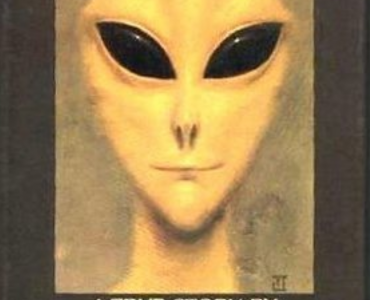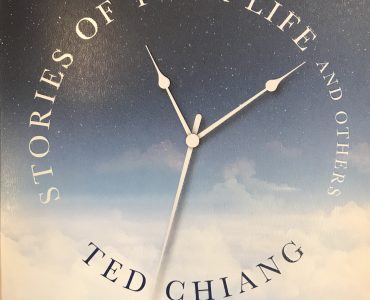Pros
- Science fiction stories are rooted in science concepts and research
- Ideas explored in this collection are more science fiction-y than previous collection
- Short stories really explore some ideas, bringing them to one plausible, logical conclusion
Cons
- Language may be a little dry for some readers
- There’s no consistency to the length of the stories
I really enjoyed Exhalation more than Stories of Your Life and Others. Exhalation has more interesting stories that are more science fiction (or speculative fiction), and as a result, I felt that this collection of short stories has more engaging stories than his first collection.
Exhalation Review
Many of the points I’ve made about Chiang’s writing style in Stories of Your Life and Others still remain true for Exhalation. One aspect of Chiang’s style is his ability to take a topic, like linguistics, create a story, and focus and carry that story to an interesting conclusion.
His stories include realistic characters that lend to the realism of the story. We got a glimpse of Chiang’s masterful storytelling ability in “Arrival.” And in Exhalation, we get more of the same character development. I particularly enjoyed the stories that dealt with time travel or alternate dimensions or worlds.
My three favorite stories in this collection are “The Merchant and the Alchemist’s Gate” and “The Lifecycle of Software Objects,” and “Anxiety Is the Dizziness of Freedom.”
In “The Merchant and the Alchemist’s Gate,” we get a few stories within a story. The story itself isn’t about the mechanism time travel. It’s more about the growth of the narrator, and there’s large spiritual component to the story that was unexpected.
The main character in “The Merchant and the Alchemist’s Gate” is Fuwaad. He’s recounting to the caliph his experience with the time gates. So the structure of the story is essentially a flashback that leads to the present time.
One interesting comment that Fuwaad makes is that one’s life is laid out by Allah, and the person experiencing this plan is there to learn the lessons. Perhaps that’s why the story follows a fairly rigid structure in terms of the flexibility of timelines.
Many people would seek to benefit financially with the power of time travel. But we don’t get a sense of financial gain from Fuwaad’s experience. Indeed, one of the stories the merchant shared with Fuwaad is about the dangers of creating a feedback loop: the thief gets rich by stealing from his future self, which causes the present-day thief to soon turn into a miser so that his past self will have something to steal later. This type of irony is reminiscent of Greek tragedies, which I thoroughly enjoyed when I was younger.
Fuwaad’s experience and the stories of the merchants show readers that time is inflexible. This idea isn’t necessarily new—recall the movie The Time Machine (2002). No matter what the protagonist attempts to do, the timeline refuses to change.
The last story of the collection, “Anxiety Is the Dizziness of Freedom,” deals with the concept of parallel universes. I believe this is also a philosophical concept, but essentially, Chiang uses the concept of parallel universes to illustrate the anxiety people feel about their lives. Did they accept the right job? Marry the right person? Make the right choice?
By allowing characters to peer into the consequences of their decisions through parallel universes, Chiang illustrates how such knowledge can paralyze people, causing them to second-guess their own lives. Many of the characters worry so much about their decisions that they’re no longer able to make a decision without fear and anxiety.
Whereas Fuwaad accepts his fate as being divine will, characters in this last story long for an ideal version of their lives, one in which they’ve made the right decision every time.
It’s also interesting that many of these characters don’t quite view their alternate selves as people who are real: the general wants to use a prism to play out different, more aggressive, scenarios, ignoring the consequences that such action may have on that alternate world.
In “The Lifecycle of Software Objects,” I appreciated the questions raised about artificial intelligences. This story gives us a lesson about how quickly our technology can advance and how our own ethical values are slow to catch up to these advancements.
My one criticism is that some of the stories, “Dacey’s Patent Automatic Nanny” seemed a bit out of place, almost as though that story was crammed into the collection to fill a story or page requirement, and perhaps the story could have explored the psychology or experience of working with androids.
For instance, would a child be different if raised by an android instead of a human? What qualities would children develop if they had android or robotic caretakers?
While I enjoyed Chiang’s writing style, it does feel a bit academic at times. I think this may turn some readers away, as they’d feel the story was too “boring” or “dry.” However, I felt that the writing is a nice change of pace from the more casual writing styles I’ve been reading.
Conclusion
Ted Chiang’s Exhalation is a much more cohesive collection of short stories than the previous collection. These stories explore various science fiction ideas, taking them to one possible, logical conclusion.
If you enjoyed Stories of Your Life and Others, you’ll definitely enjoy Exhalation. I don’t think you can go wrong with either book, though given a choice, I’d recommend this more current collection if you’re a science fiction fan.



